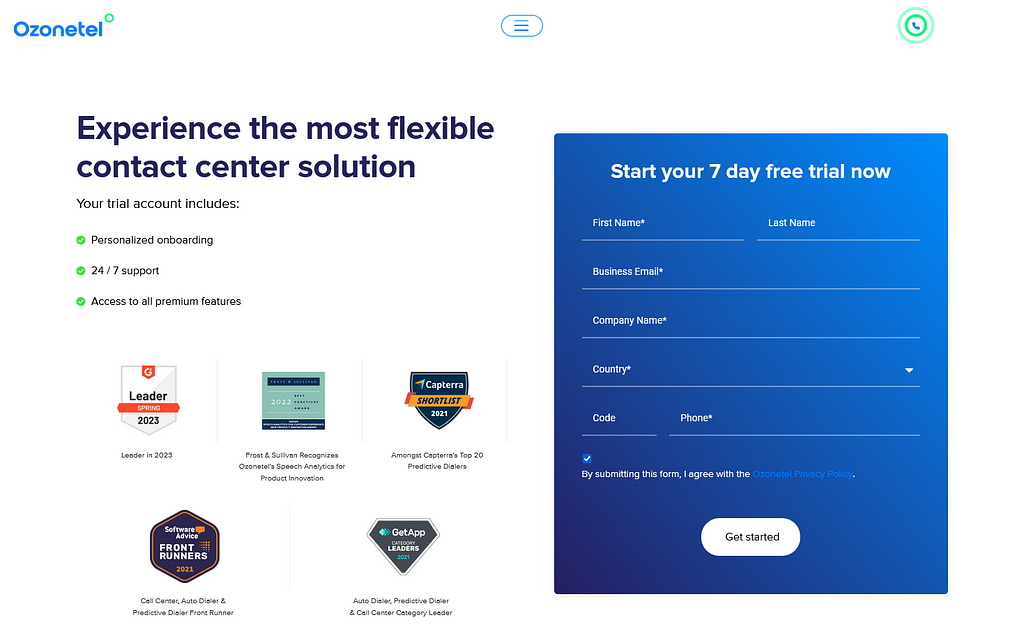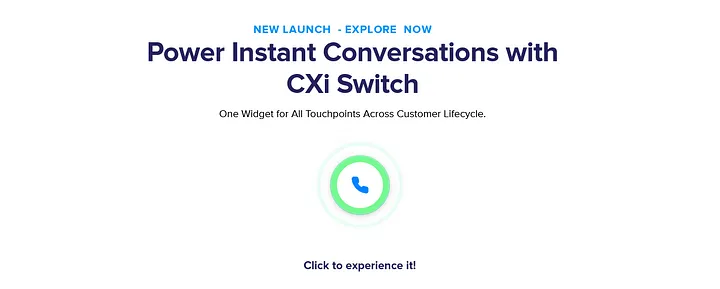- Resources
- The Top 15 Customer Experience Software You Need to Know About
The Top 15 Customer Experience Software You Need to Know About

What does it take to deliver a superior customer experience? It begins with the intent to deliver, followed by a well-crafted strategy and effective execution. Customer experience is the key to building lasting and profitable relationships with your customers. CX is the way your customers perceive your brand, based on their interactions with you across various channels and touchpoints. And the numbers below highlight the importance of good CX
As you can see, CX is not only important, but essential for your business’ success. It is no longer enough to just offer a product or service, but to create a memorable and positive impression on customers. A CX platform can help you achieve and sustain a competitive edge in the market. A CX software can also help you create loyal customers who will advocate for your brand and bring in more revenue.
What is a Customer Experience Platform?
A Customer Experience (CX) platform is a comprehensive solution that facilitates seamless interactions between businesses and customers. It integrates various tools and technologies to streamline communication, personalize experiences, and optimize operations. CX platforms leverage data-driven insights, allowing businesses to understand customer behaviors and preferences. Furthermore, they automate processes, enhance agent productivity, and proactively resolve issues, ultimately fostering customer satisfaction, loyalty, and retention.
How Customer Experience Platforms Help Businesses
A robust CX platform is pivotal in enhancing various facets of customer experience. It can help brands provide a comprehensive and integrated solution in the following ways
Streamlining Customer Interactions: A CX platform can help you simplify and optimize customer touchpoints to ensure seamless, efficient, and frustration-free communication at every stage.
Personalizing Customer Experiences: Understand your customers better through data-driven insights. Tailor interactions based on individual preferences, behaviors, and history to create a more meaningful and relevant customer journey.
Increasing Operational Efficiency: Boost productivity by automating processes, reducing manual effort, and ensuring smooth workflows within the customer service infrastructure.
Boosting Employee Productivity: Give your team necessary tools and resources to enhance efficiency. This will help them to deliver better service and meet customer needs effectively.
Gaining Actionable Insights: Collect and analyze valuable data to gain a deeper understanding of customer behaviors, preferences, and pain points for strategic decision-making.
Reducing Customer Churn: Implement strategies to retain customers, address concerns proactively, and provide ongoing value to minimize customer attrition.
Enabling Proactive Issue Resolution: Identify and address potential problems before they escalate, demonstrating a proactive approach to customer service and satisfaction.
Supporting Continuous Improvement: Foster a culture of ongoing enhancement by using customer feedback and data to refine processes, services, and overall customer experiences.
Top 15 Customer Experience Platforms

1. Ozonetel
Ozonetel CX Platform combines the capabilities of contact center, communication APIs, customer engagement, and workforce management, to provide a superior experience for its customers. The AI-powered solution has facilitated over 2 billion calls on its platform, empowering 2,500+ businesses to simplify, manage, and analyze interactions throughout their customer communication and engagement journey.
Advantages:
Comprehensive Features: Benefit from features such as intelligent IVR, call recordings, live call monitoring, analytics, and ready-made CRM integrations.
Omnichannel Engagement: Engage with customers seamlessly across voice, chat, SMS, WhatsApp, and various digital channels at every touchpoint.
Open API Platform: Leverage an open API platform to integrate with other business solutions, allowing the design of seamless workflows.
Rapid Deployment: Experience the industry’s fastest deployment; have your cloud contact center operational within 24 hours.
Personalized Onboarding and Support: Receive unmatched personalized onboarding, training, and 24/7 live phone support.
Automation: Use automation to efficiently handle higher call and chat volumes across digital and voice channels, allowing more customers to connect at their convenience.
Flexible Scaling: Adapt to changing needs with monthly price plans and a unique interface, enabling the easy scaling up or downsize of agents across any channel.
Ozonete G2 Ratings is 4.5 out of 5
User reviews: The Ozonetel cloud agent has many of the best features and provides ease of use with a simple interface for the agents.
2. Salesforce
Salesforce is the world’s leading customer experience management software. It consolidates all customer data across sales, service, marketing, commerce, and more to create a unified 360-degree customer view. Salesforce’s CX capabilities include AI-driven analytics, omnichannel engagement, customer service and support, field service management, marketing automation, and commerce and order management.
Advantages:
- Highly customizable platform with the ability to tailor to unique business needs
- A robust third-party app ecosystem provides access to thousands of integrations
- Powerful analytical capabilities provide data-driven insights
- Omni-channel engagement tools deliver personalized customer experiences
- Scalable to grow with the business and integrate new technologies
Scope for Development:
- Complex pricing models can be confusing for first-time buyers
- Extensive training and expertise are required to leverage full capabilities
- Not cost-effective for small or mid-sized businesses
- Heavy reliance on technical resources for implementation and maintenance
Salesforce G2 Ratings is 4.3 out of 5
User Reviews: Streamlined process, efficient tool for lead management
3. Adobe Experience Cloud
Adobe Experience Cloud is an end-to-end CX software that spans marketing, advertising, analytics, content creation, and commerce. It aims to deliver hyper-personalized customer experiences across digital and physical touchpoints. Adobe Experience Cloud combines Adobe Marketing Cloud, Adobe Advertising Cloud, Adobe Analytics Cloud, and Adobe Commerce Cloud.
Advantages:
- Robust analytics and segmentation capabilities provide actionable insights
- Integrated marketing and advertising optimizes CX across channels
- Sophisticated content creation and management tools
- Omnichannel commerce capabilities, from browse to buy
- Real-time customer data and profiling
Scope for Development:
- The steep learning curve to master a wide range of functionality
- Fragmented user experience across many applications
- Costly and complex for small business budgets
- Requires deep expertise to implement and customize
- Advertising and commerce capabilities require additional add-ons
Adobe Experience Cloud’s G2 Rating is 4.1 out of 5.
User Reviews: “A versatile tool that can make a marketer’s life easier.”
4. Oracle CX Cloud
Oracle Customer Experience (CX) Cloud is an integrated suite of applications spanning sales, marketing, service, commerce, and loyalty. It aims to enable seamless end-to-end customer experiences across channels with data-driven insights.
Advantages:
- Unified customer data provides a complete view across touchpoints
- Powerful analytics inform strategic CX decisions
- Omnichannel engagement via multiple Customer Experience (CX) applications
- Industry-specific solutions tailored for major verticals
- Reliable and secure cloud infrastructure
Scope for Development:
- Complex implementation requires heavy customization
- Expensive licensing model, especially for a la carte applications
- Not easy to integrate with third-party systems
- Requires significant training and expertise
- Mostly tailored for large enterprises
Oracle CX Cloud G2 rating 3.9 out of 5
User Review: Oracle Sales Analytics empowers sales teams to optimize performance with real-time insights, actionable data, and centralized pipeline management.
5. Zendesk
Zendesk is a popular cloud-based customer service and engagement platform for customer support teams. It provides capabilities like omnichannel customer interactions, self-service customer support via the help center and knowledge base, and agent desktops for productivity.
Advantages:
- Intuitive, easy-to-use interface speeds up agent onboarding
- Cost-effective solution compared to complex CX platforms
- Readily integrates with hundreds of third-party applications
- Flexible plans to get started for all business sizes
- Modern infrastructure is frequently updated with the latest innovations
Scope for Development:
- Lightweight analytics with limited actionable insights
- Lacks advanced personalization capabilities
- Minimal marketing automation functionality
- Multiple apps are needed to enable comprehensive features
- The primary focus is customer service vs. complete CX
Zendesk G2 rating 4.3 out of 5.
Users Review: It provides a much better overview, a great and user-friendly interface, and a high level of customization for automation.
6. ServiceNow
ServiceNow provides a cloud-based platform to digitize and automate workflows across enterprise departments and functions. It has capabilities for IT service management, human resources, security operations, customer service management, and more.
Advantages:
- Powerful workflow automation increases efficiency
- IT service management capabilities optimize tech support
- A unified platform enhances cross-departmental collaboration
- Agile and adaptable with rapid deployment
- Enterprise-level scalability and reliability
Scope for Development:
- Steep learning curve to leverage full capabilities
- Complex implementation requires heavy configuration
- Expensive licensing model, especially for addons
- Fragmented user experience across different applications
- Not purpose-built only for customer service
ServiceNow G2 rating is 4.4 out of 5
User Review: The best thing I like about ServiceNow IT Service Management is its tracking each detail of a particular request.
7. SAP C/4HANA
SAP C/4HANA is SAP’s next-generation CX software for marketing, sales, service, and commerce. It aims to manage end-to-end consumer engagement with embedded AI for intelligent enterprises. SAP C/4HANA consolidates SAP Hybris, CallidusCloud, Coresystems, Gigya, and Qualtrics.
Advantages:
- Unified real-time view of each customer
- Leverages complete SAP ecosystem for robust CX capabilities
- Intelligent technologies like AI, ML, and predictive analytics
- Industry-specific solutions for strategic CX transformation
- Global presence, enterprise-grade performance, and security
Scope for Development:
- Complex and challenging implementation
- Costly licensing model requiring heavy investment
- Requires expertise in the SAP ecosystem to customize
- Interoperability challenges with non-SAP systems
- Not ideal for small and mid-sized organizations
Capterra user ratings are 4.3 out of 5.
User review: SAP Commerce Cloud provides solutions for e-commerce with great customer experience, powerful content management and product management
8. Sitecore
Sitecore Experience Platform (XP) is a market-leading web content management and digital experience software. It provides capabilities for personalized omnichannel digital interactions across web, social, and mobile channels.
Advantages:
- Powerful capabilities for customer segmentation and personalization
- Robust analytics inform strategic experience optimization
- Flexible integration capabilities with third-party systems
- Headless CMS capabilities for future-proof architecture
- Firm partner and developer community
Scope for Development:
- Complex implementation requires significant expertise
- Challenging to customize without proper training
- The pricing model can be expensive for growing businesses
- Does not have a built-in CRM system
- Focused on digital channels vs complete CX
Sitecore Experience, Platform G2 rating, is 3.9 out of 5
User reviews: Sitecore provides fast time to market a web application. It’s rich in features like SXA, Commerce, Personalization, etc.
9. Freshworks
Freshworks provides a full suite of modern SaaS-based CX software for businesses of all sizes. Its integrated products include Freshdesk for customer support, Freshservice for IT service management, Freshsales CRM, Freshmarketer marketing automation, Freshconnect customer data platform, and more.
Advantages:
- Intuitive and easy-to-use interfaces speed up adoption
- Cost-effective pricing suitable for SMBs
- Readily integrates with third-party applications
- Fresh Success provides actionable CX analytics
- Developer-friendly platform to build custom apps
Scope for Development:
- Lightweight capabilities insufficient for advanced use cases
- Some gaps in platform integration and unified data
- Partial mobile optimization is yet to match the web experience
- Limited customization without developer resources
- Sparse partner ecosystem for enterprise implementations
Freshworks G2 rating is 4.5 out of 5
User Review: Every user gets its tickets so it is very easy to track customer interactions with the brand. It is an everyday usage tool.
10. Zoho
Zoho is a leading SaaS business software provider that offers an expansive suite of cloud-based business applications for sales, marketing, customer support, HR, finance, and more. Zoho CRM enables sales force automation, marketing automation, customer service, and help in a unified suite.
Advantages:
- Cost-effective pricing is ideal for SMB customers
- User-friendly interface with little training needed
- Tight integration between Zoho apps
- Scalable to grow with evolving business needs
- Local support offices worldwide
Scope for Development:
- Not built for the complex needs of large enterprises
- Integration limitations with third-party apps
- Light on advanced analytics and customization capabilities
- Fragmented modules result in a disjointed user experience
- Per-user licensing can get expensive as the team grows
Zoho G2 rating is 4.0 out of 5
Users review: All the apps are integrated. It is functional and useful for my own business as well as for my client’s businesses.
11. HubSpot
HubSpot CRM is an integrated SaaS platform for inbound sales, marketing, services, and operations. It aims to help companies attract visitors, convert leads, and delight customers. HubSpot CRM is offered as part of their free CRM or paid marketing hub, sales hub, and service hub products.
Advantages:
- Free basic CRM version available
- Intuitive and straightforward interface
- Integrated end-to-end sales, marketing, and service
- Ideal for lean startups and growing SMBs
- Thriving online community and marketplace
Scope for Development:
- Limited flexibility and customization options
- Complex pricing for growing organizations
- Lacks some enterprise-grade capabilities
- Reliant on HubSpot’s inbound methodology
- Integration gaps with non-HubSpot tools
HubSpot G2 rating is 4.4 out of 5
User Review: It is much easier to analyze data and improve revenue performance.
12. NICE inContact
NICE inContact is a leading cloud customer experience software focused on contact centers. It unifies data across channels like voice, text, chat, email, and back-office systems. NICE inContact provides workforce optimization, omnichannel routing, self-service IVR, analytics, and AI-driven capabilities.
Advantages:
- Omnichannel interactions via voice, SMS, chat, email, etc.
- Workforce optimization and call center management
- Advanced IVR capabilities and visual builder
- CX analytics and artificial intelligence
- Flexible, cloud-based delivery model
Scope for Development:
- More focused on contact centers than a full CX suite
- Limited personalization capabilities
- Agent desktop lacks some features offered by others
- Requires expertise to customize workflows
- Pricing can get steep for enterprise use cases
NICE inContact capterra user rating is 4.2
User Reviews: It’s a one-stop shop for customer service needs, with support for phone calls, emails, instant messaging, and more, as well as call monitoring and conversation tracking across all channels.
13. Pega
Pegasystems offers comprehensive CX software to connect marketing, sales, and customer service. Its AI-powered Pega Platform aims to help brands manage the entire customer lifecycle journey. Industry solutions are tailored for banking, healthcare, insurance, and communications verticals.
Advantages:
- A unified customer profile provides a complete view of the data
- Industry-specific solutions for faster ROI
- Robust analytics, personalization, and automation
- Omnichannel engagement capabilities
Scope for Development:
- Steep learning curve given the complex functionality
- Lengthy implementation cycles
- Expensive licensing model
- Reliant on scarce Pega expertise to customize
- Challenging integration with existing martech stacks
Pega G2 rating is 4.2 out of 5
User reviews: Pega Platform is designed to scale to meet the needs of large enterprises with complex business processes.
14. Acoustic
Acoustic provides an open and independent Customer experience management software spanning marketing, analytics, commerce, and customer data management. It aims to help brands deliver personalized customer experiences across channels. Acoustic consolidates products from IBM like Tealeaf, Campaign, Content, Analytics, etc.
Advantages:
- Consolidates customer data across disparate sources
- Powerful analytics to drive insight-led experiences
- Sophisticated personalization based on AI/ML
- The agnostic platform integrates with existing martech
- Flexible deployment model via public/private cloud
Scope for Development:
- Acoustic-centric approach limits some capabilities
- The complex implementation gives vast functionality
- Steep learning curve and training requirements
- No built-in CRM or service desk components
- Legacy IBM portfolio gaps to fill
Acoustic G2 users rating is 3.7 out of 5
User reviews: Acoustic Campaigns is a customer experience automation tool with features.
15. Mixpanel
Mixpanel is a product analytics SaaS platform that helps analyze user behavior across mobile and web applications. This enables product teams to understand engagement, optimize user experience, and increase retention.
Advantages:
- Quick and seamless implementation
- Powerful analytics on product usage data
- Flexible segmentation of users
- Easy-to-use interface and workflows
- APIs enable integration with other tools
Scope for Development:
- Focused on product analytics vs full CX suite
- Limited capabilities beyond core analysis
- Steep pricing for enterprise-level usage
- Data export functionality lacking
- Primarily targeted at technical users
Mixpanel’s G2 rating is 4.6 out of 5
User Reviews: The platform’s strength lies in its comprehensive data analysis tools that enable us to dissect raw data comprehensively. Additionally, Mixpanel’s integration features are seamless and enhance its utility.
Selecting the ideal CX platform
Selecting the ideal CX platform requires clearly defining your requirements and goals, analyzing leading solutions against those needs, and evaluating long-term alignment with your digital strategy. The platform must consolidate customer data across channels into an actionable unified profile to inform engagement. Powerful analytics, seamless omnichannel orchestration, and personalization driven by AI are vital capabilities to drive contextual customer journeys.
An open and flexible architecture that integrates with current tech stacks is vital for future-proofing investment. Opt for a scalable provider with strong CX expertise and proven reliability. Comparing the total cost of ownership against the expected ROI will determine true long-term value.
Key considerations when choosing a CX platform:
- Unified customer profile with data consolidation
- Analytics and business intelligence capabilities
- Omnichannel customer engagement
- Personalization powered by AI/ML
- Easy integration with current architecture
- Scalability for changing needs
- Total cost of ownership vs ROI
- Provider CX expertise and support
Future of Customer Experience Platforms
CX platforms are expected to leverage AI, ML, and blockchain technologies for more predictive and hyper-personalized experiences. Voice and video-based interfaces will become prominent. Integrations with emerging channels like IoT and virtual assistants will further unify CX. As technology evolves, the goal of CX platforms remains to deliver empathy at scale to turn customers into true brand advocates.
Looking ahead, AI will be integral to delivering smooth omnichannel experiences. It will power self-optimizing CX platforms that learn continuously. AI also democratizes CX by making relevant insights and best practices easily accessible to companies. With responsible use of AI, brands can build human-centric engagement that makes customers feel valued as individuals.
Key AI applications in CX:
- Predictive analytics and segmentation
- Natural language chatbots and virtual assistants
- Recommendation engines
- Customer sentiment analysis
- Intelligent process automation
- Fraud detection and security
- Lifetime customer value optimization
Conclusion
Customer experience software play a pivotal role in customer retention and business growth. They provide data-driven insights and tools to orchestrate smooth, consistent journeys across touchpoints. While capabilities and costs vary, CX platforms are worthwhile investments into the customer lifecycle. Leading solutions help drive higher revenue and brand loyalty via optimized experiences.
Ready to take control of your call transfer
experience for better CX outcomes?
Prashanth Kancherla
Chief Operating Officer, Ozonetel Communications
Over the past decade, Prashanth has worked with 3000+ customer experience and contact center leaders...
Chief Operating Officer, Ozonetel Communications
Over the past decade, Prashanth has worked with 3000+ customer experience and contact center leaders to comprehensively understand the need for effective and efficient customer communications at every step of their journey with a brand. Deeply embedded in today’s CCaaS ecosystem, he has been instrumental in Ozonetel's growth and contributed in various roles including product management, sales, and solution architecture.





















